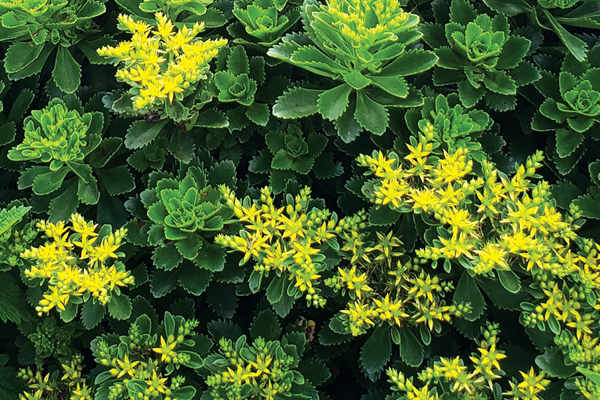Bold isn’t always big
Published 11:44 am Friday, August 7, 2020

- The densely clustered foliage of seum makes a beautiful mound or a thick carpet of dark green. Sedum is a great candidate for the xeriscape garden, or as a complimentary understory for conifers. Its reliable habit contributes beautifully to container combinations, both winter and summer.
|
Getting your Trinity Audio player ready...
|
BY CAROL REESE
UT Extension Horticulturist
Green plants are everywhere you look. It is easy to walk past a little green plant a dozen times or even a dozen years without noticing it, until the day its perfect beauty demands attention. Appreciation is amplified when that little green plant makes no demands on the gardener for being exquisite.
It’s hard to think of a lower maintenance plant than a sedum, though they cannot be lumped together for appearance or performance. There are dozens of sedum species and multitudes of cultivars. Some made their way to garden centers for interesting purple, golden or variegated foliage. Many are noted for colorful flowers, including several valued for blooming late in the season when other blooming perennials have passed their peak.
Those characteristics are not this sedum’s charm. While Sedum takesimense, also known as Phedimus takesimense, does offer bright yellow flowers in midsummer, and the variegated form called ‘Atlantis’ has garnered much attention of late, don’t let that distract you from the beauty of its “plain green” form. It’s all about the texture and growth habit. The densely clustered foliage makes a beautiful mound or, allowed to grow unchecked, a thick carpet of dark green. Finely scalloped margins frill the edges of perfectly formed rosettes of leaves, each a study of complex symmetry.
Some sedums touted as groundcovers sprawl awkwardly and grow leggy, with more stems than foliage, but that is not the case with Sedum takesimense. Sites with good drainage and adequate sunlight can yield close-knit coverage, even where it is allowed to cascade over the edge of a raised bed or container. Easily hardy through Zone 5, and evergreen in our climate, some sites say it can be grown as far north as Zone 4. It also thrives in the heat and humidity of summers through at least Zone 8 and possibly warmer zones.
The plant’s one struggle is with a common name. A robust Internet search reveals most sites simply dodge the issue, deciding to label it as a stonecrop, a generic common name for all sedum. This particular sedum has been promoted at the UT Gardens for its beauty and adaptability. It is also favored by Paul Little, the owner and proprietor of Little Hill Nursery, a specialty groundcover producer in Memphis who is often referred to by his nickname “Johnny Apple-Sedum.” One day he called me to ask, “Which sedum are you telling people is your favorite? They can never remember the name!”
I confessed it was Sedum takesimense, and hoped that Paul as a renowned sedum expert would supply me with a viable common name. Instead, there was a sigh, and after a pause he asked, “Is it okay with you if I label it ‘Carol’s Favorite’? It won’t carry this label outside the Memphis area, so learn the Latin name or make a note of it on your cell phone to share with a salesperson at your local nursery.
This useful sedum is a great candidate for the xeriscape garden, or as a complimentary understory for conifers. Its reliable habit contributes beautifully to container combinations, both winter and summer.
Growing 6 to 8 inches tall, it can spread as far as you will let it, but it is not aggressive, as the root system stays surprisingly shallow for a plant so very drought tolerant. Shallow roots make it easy to pull up where it is not wanted. Those pieces will transplant readily to new sites in your garden, or are easily shared with gardening friends.
This sedum is located in the rock garden at the UT Gardens, Knoxville, and can be seen at the UT Gardens, Jackson, in the succulent bed at the north entrance of the building.
(The UT Gardens includes plant collections located in Knoxville, Crossville and Jackson. Designated as the official botanical garden for the State of Tennessee, the collections are part of the UT Institute of Agriculture. The Gardens’ mission is to foster appreciation, education and stewardship of plants through garden displays, educational programs and research trials. The Gardens are open during all seasons and free to the public. For more information, see the Gardens website: utia.tennessee.edu/state-botanical-garden.)





